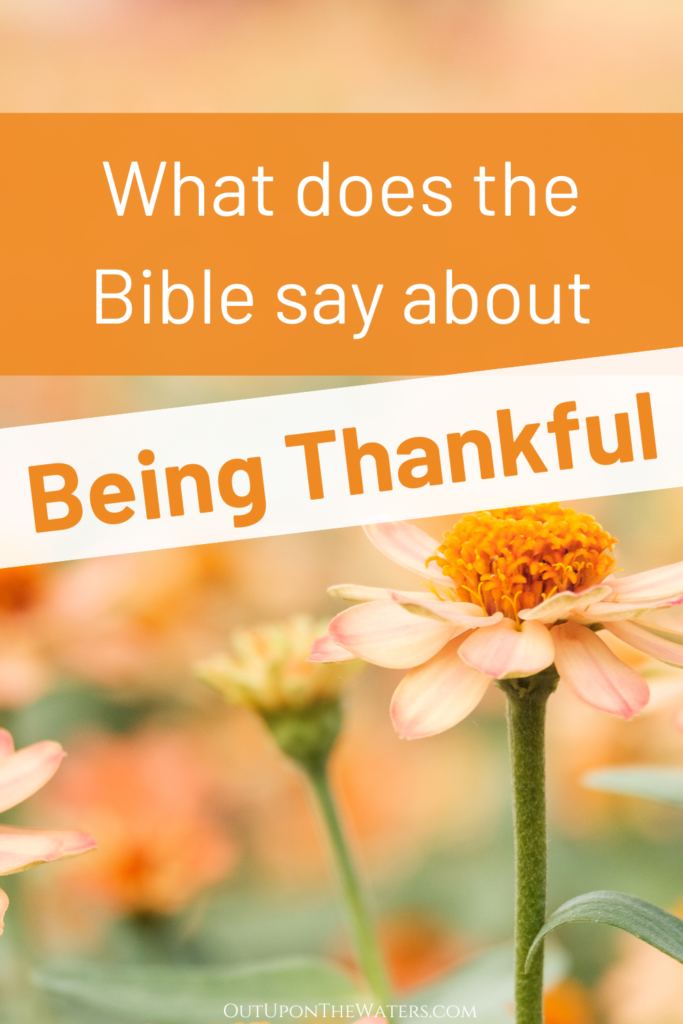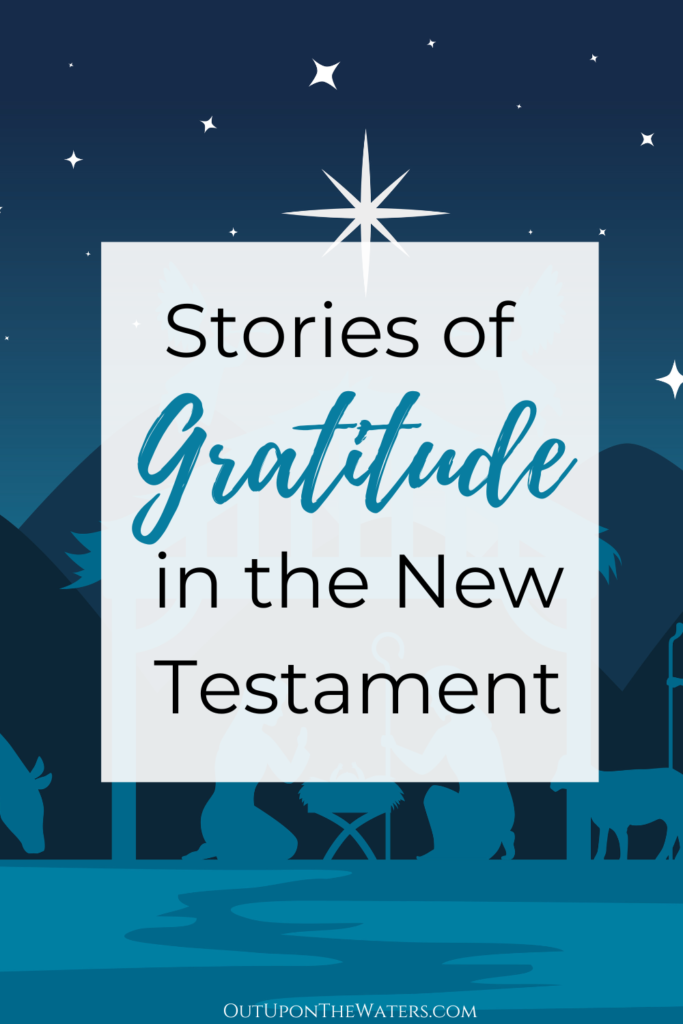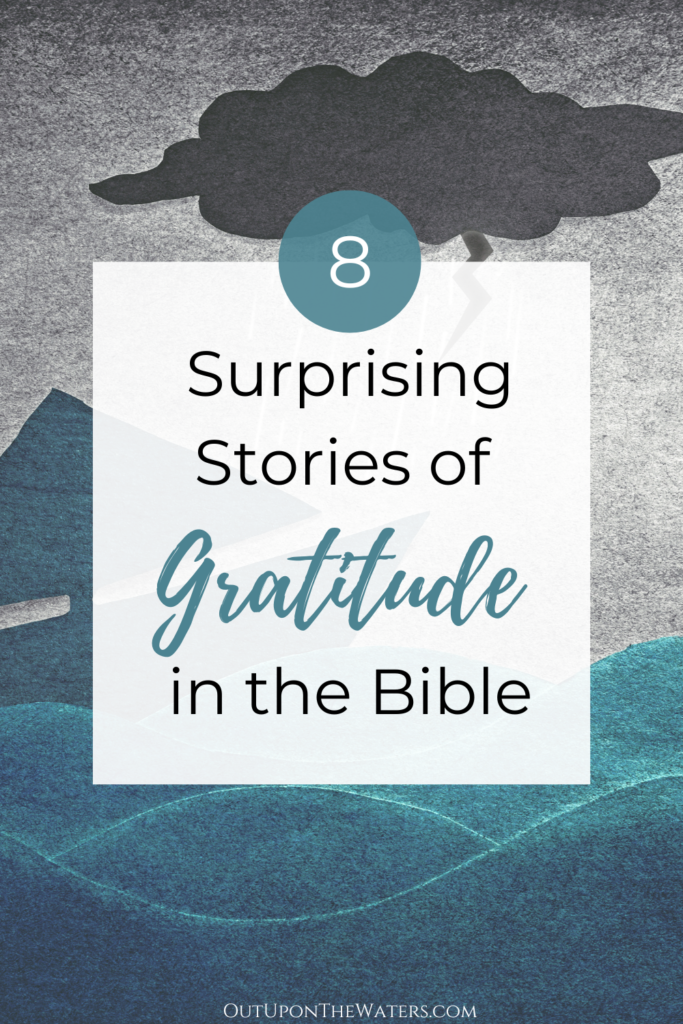There are plenty of stories of gratitude in the Bible, from both the Old Testament and the New Testament. Among the examples of gratitude in the Bible, we see people giving thanks for good news, after receiving blessings, after benefiting from a miracle… We also see people giving thanks in the midst of battle, in the midst of scarcity, when facing huge challenges, and in other surprising and unexpected circumstances. Here are 18 surprising and enouraging stories about gratitude in the Bible.

What does the Bible say about being thankful?
We see examples, stories, and verses about thankfulness throughout Scripture. What we learn from these stories and Bible verses is that God wants us to give thanks in all circumstances. In 1 Thessalonians 5:18, the apostle Paul tells us: “In every thing give thanks: for this is the will of God in Christ Jesus concerning you.“
We can give thanks for the blessings that God bestows upon us, for miracles, for the goodness and greatness of God, for his guidance and provision… We can also give thanks even in the hard times because we know that God promises to restore and redeem all things. We are promised salvation and resurrection through Christ Jesus, and so we can be grateful in all circumstances. We can be grateful that the we know how the story ends, and that in the end, God wins.
Being grateful and counting our blessings helps us to acknowledge that all good things come from God. When we thank God for the blessings in our lives, we acknowledge that he is the source of all good things. When we gives thanks even in trying times, we show our trust even more. We acknowledge that God is sovereign and we express our trust that he has things under control. Gratitude in trying times helps us to release the anxiety and worry about our circumstances and exchange that worry for trust in God.
Read more about gratitude in the Bible by exploring these 53 Bible verses about gratitude. Or explore the question: why are we supposed to give thanks in all circumstances?
Read on for a collection of encouraging, inspiring, and sometimes surprising stories of gratitude in the Bible.
Stories of Gratitude in the Bible
There are plenty of examples of thanksgiving in the Bible. Here is a collection of 19 stories about gratitude in the Bible that will hopefully encourage and inspire you.

Stories about Gratitude in the Old Testament
There are plenty of stories of gratitude in the Old Testament. There we see examples of people giving thanks in difficult circumstances, giving thanks for victory against long odds, for protections, deliverance, and healing…. The key theme that runs throughout Old Testament stories of gratitude is one of trusting God in all circumstances.
King David, the Ark of the Covenant, and the Psalms
King David is an excellent example of gratitude in the Bible. In 2 Samuel 6, we read of David and all his men attempting to bring the ark of the covenant, back to Bethlehem, after it had been missing from the land of Israel for many years.
The ark represented God’s presence among the people, and his love and blessing. David wanted the ark back.
After a failed attempt when David doesn’t follow God’s plan, David follows God’s guidance and the ark is returned to the city of David. As the ark was returning to the city, King David was seen leaping and dancing in the street. And when the ark returned and David set it inside the tent, he sacrificed burnt offerings in thanksgiving to God.
In this story, we see David’s gratitude for the return of the ark of the covenant, the symbol of God’s presence among his people, and God’s blessing on them.
We see David’s gratitude even more in the Psalms. In the Psalms, David recounts the struggles and triumphs of his life, and he consistently praises and give thanks to God through all circumstances.
Read: 2 Samuel 6, Psalms
Jacob has a thankful heart
At the end of Jacob’s life, aftre he was reunited with his son Joseph (who had been sold into slavery in Egypt), he thinks back on his life and how God had blessed him. God had promised Jacob many descendents, and Jacob assure Joseph that the sons born to him in Egypt would be part of their family line. When Jacob sees the sons of Jospeh, he marvels, “I never expected to see your face again, and now God has allowed me to see your children too” (Genesis 48:11).
Just before he died, Jacob blessed Joseph and his sons, as well as the rest of Jacob’s own sons. In his last moments, he expresses gratitude for what God has done in his life and he blesses those around him.
Read: Genesis 48
Noah gives thanks after the flood
After spending 150 days inside the ark, we are told that “God remembered Noah and all the wild animals and the livestock that were with him in the ark, and he sent a wind over the earth, and the waters receded” (Genesis 8:10). When the waters recede, and Noah, his family, and all of the wild animals are able to come out onto dry land, the first thing that Noah does is build an ark and make a sacrifice of thanksgiving to God.
After having endured hard work, uncertainty, confinement inside the ark for months, Noah gives thanks that God brought him and his family safely through the storm.
Read: Genesis 8
Deborah sings praise for victory against long odds
The Israelites had been facing an army much larger and more powerful than they. And yet, God gave them the victory. In Judges 5, Deborah’s song tells of the challenges and the victories faced by God’s people. Deborah’s song is one of praise and thanksgiving for victory against long odds.
Read: Judges 5
Moses and Miriam gives thanks for protection and deliverance
One of the first times that we see gratitude expressed in poetry and song is in the song of Moses and Miriam in Exodus 15.
After God miraculously parts the Red Sea so that the people of Israel can escape the Egyptian army that had been pursuing them, Moses and Miriam respond with a song of praise and thanksgiving, telling the story of Israel’s escape. Their song recounts the story of God’s rescue, marvels at the majesty and holiness of God, and expresses confidence in God’s guidance and protection.
Read: Exodus 15
Namaan gives thanks for healing
In 2 Kings 5, we read of the prophet Elisha healing a man named Namaan of leprosy. Namaan was the commander of the army of the king of Aram, a country that was at war with Israel. When a captured Israeli slave girl tells him that he could be cured of his leprosy if he would go see the prophet Elisha, he does so. Elisha tells Namaan to, “Go, wash yourself seven times in the Jordan, and your flesh will be restored and you will be cleansed (2 Kings 5:10). Namaan initially storms off in anger, convinced that the waters of Israel are inadequate for this purpose. When he finally does what Elisha told him to do, however, he is indeed healed of his leprosy, and he returns to Elisha with gifts of thanksgiving.
Namaan’s gratitude, in fact, is not only for healing, but also for knowledge of God. “Now I know that there is no God in all the world except in Israel. So please accept a gift from your servant” (2 Kings 5:15). Namaan’s healing and his knowledge of God are intimately linked in this story.
Read: 2 Kings 5
Jehoshaphat gives thanks in the midst of battle
When King Jehoshaphat found himself surrounded by three armies, he was alarmed and distressed. He proclaimed a fast for all Judah and the people of Judah came together to pray, seeking help from God. Jehoshaphat’s prayer expresses deep faith in God, confidence in his protection, and he asks God for help.
The Spirit of the Lord, through a man named Jahaziel, tells Johoshaphat, “Do not be afraid or discouraged because of this vast army. For the battle is not yours, but God’s” (2 Chronicles 20:15). God assured Jehoshaphat that he will be with him, that Judah would not have to fight this battle, and that they would see the deliverance of the Lord.
With this promise, Jehoshaphat tells the people to go out and sing praises to the Lord” “Give thanks to the Lord, for his love endures forever” (2 Chronicles 20:21). The people of Judah are indeed spared the battle, as ambushes had been set up and other nations destroyed the armies and then themsevles.
When the army of Judah arrived, the battle was already over. Jehoshaphat and his people had given thanks to God for the promise of protection and deliverance, while still in the midst of uncertainty and danger.
Read: 2 Chronicles 20

Stories about Gratitude in the New Testament
There are many stories of gratitude in the New Testament that tell us of people giving thanks for good news, for healing, and for salvation. (Read on for even more surprising stories of gratitude from the New Testament below.)
Mary gives thanks for good news
When Mary is a young girl, pledged to be married to a man named Joseph, the angel Gabriel comes to her and tells her that she is highly favored by the Lord and that she will give birth to a son. At first, Mary is troubled by Gabriel’s words, wondering how this is possible since she is a virgin. Once Gabriel explains to her that God himself will be the child’s father, through the Holy Spirit, Mary answers with faith and confidence, saying “May your word be fulfilled” (Luke 1:38).
Mary travels to visit her cousin Elizabeth to share the good news, where she sings praises to God. Mary’s response to the angel Gabriel’s news that she will give birth to a son – who will be holy, who will reign on David’s throne, who will have an everlasting kingdom, and who will be called the Son of God – is to sing a song of praise and thanksgiving.
Mary’s joy over this good news is so great that it overflows in songs of praise.
Read: Luke 1:46-54
One thankful leper
In the story of the ten lepers, we see Jesus heal ten men with leprosy. Only one of them, “when he saw he was healed, came back, praising God in a loud voice. He threw himself at Jesus’ feet and thanked him” (Luke 17:15-16).
Of the ten who were healed, only one returned to thank Jesus. This short story about gratitude in the Bible can serve as a reminder to us to pause after we have received provision from God and to say “thank you”.
Read: Luke 17:11-19
The woman with the alabaster jar
In the Gospel of Matthew, before Jesus’ arrest and crucifixion, there happens a story of a woman who comes to see him and brings an alabaster jar of very expensive perfume. She pours it on Jesus’ head, annointing him. When the disciples express their outrage at this “waste”, Jesus explains that the woman had done a beautiful thing, and that she is preparing him for burial.
In the Gospel of Luke, we find a similar story of a woman who annoints Jesus’ feet with expensive perfume. There, it is a Pharisee who objects to the gesture, on the basis that the woman is a sinner and shouldn’t be touching Jesus. Jesus explains that this action is one done out of love and gratitude, and that all her sins are forgiven.
In both versions of this story, we see a woman give up something very precious to her in an act of gratitude towards Jesus, gratitude for salvation.
Read: Matthew 26:6-13, Luke 7:36-50

Surprising Stories of Gratitude in the Bible
The Bible is full of stories and examples of gratitude. Some of them are stories where someone gives thanks for something good and miraculous that happened. These are stories of gratitude that we might expect. But there are also some unexpected and surprising stories of gratitude in the Bible, where someone gives thanks in a very unexpected circumstance. Here are eight surprising examples of gratitude in the Bible.
Jonah give thanks in the belly of the whale
Jonah is the prophet who famously runs in the opposite direction of God’s plan for him. Jonah boards a boat, sails away from Nineveh (which is where God told him to go, to preach repentance), and then finds himself in the midst of a huge storm. After some questioning from the crew, and when things look dire, Jonah volunteers to be thrown overboard in order to save the other men on the ship. After plunging into the sea, Jonah lands in the belly of a whale. While still in the belly of the whale, Jonah gives thanks to God.
Jonah’s prayer, while he is in the belly of the whale, begins with a description of sinking to the bottom of the ocean. It is a description of the lowest part of Jonah’s life, a descent into the depths of darkness (the lowest part of Jonah’s life coinciding with the lowest point on earth). After Jonah describes this sinking, he says that God rescued him, and he ends in gratitude. He says that at this low point, he remembered God and he prayed, and he tells God that he will approach him with thanksgiving.
What is surprising about this story of gratitude is that it happens *in the belly of the whale*, not on the shore once Jonah has been rescued. Jonah expresses gratitude in the midst of uncertainty, when he doesn’t know what will happen next – he can only trust and hope.
This is an important lesson that we learn about gratitude in the Bible: we can give thanks even in dire circumstances because we know that God is in control.
Read: Jonah 1-4
Daniel gives thanks despite great risk
Daniel had been born into a noble family, but had become enslaved in Babylon and trained to assimilate into Babylonian culture. Despite this, Daniel remained faithful to God his whole life, even when it meant risking his own life. He continually distinguished himself during the rise and fall of two kingdoms, interpreting dreams for the kings, prophesying, and bringing “insight, intelligence, and outstanding wisdom” (Daniel 2, 4-5). Becaue of this, King Darius wanted to appoint Daniel to the second highest position in the kingdom. The other officials, out of jealousy, wanted to take Daniel down. And so, they conspired against him and convinced King Darius to issue a decree, lasting thirty days, that whoever prayed to any god or human being other than the king himself would be thrown into a lion’s den.
Daniel, being faithful to God, continued with his daily prayers. After he learned of the decree, he went home, “got down on his knees and prayed, giving thanks to his God, just as he had done before” (Daniel 6:10). The men found Daniel praying and brought him before the king, forcing him to throw Daniel into the lion’s Den. God protected Daniel, sending an angel and shutting the mouths of the lions, which kept him safe all night in the lion’s den.
What is so significant and surprising about Daniel’s prayer of gratitude, is that he gives thanks to God despite great risk to himself. He knows that praying to God will land him in a den of lion’s, and yet his response to God is to give thanks.
Read: Daniel 6
Paul gives thanks in the middle of a storm
In Acts 27, we read that Paul had been imprisoned and put on a ship sailing for Rome. The ship gets caught in hurricane force winds and the men fear for the ship’s safety and their lives. The crew tries to hold the ship together by passing ropes underneath, and then they throw cargo and the ship’s tackle overboard. After many days being caught in the storm, having not seen the sun or the stars for days, the men “gave up all hope of being saved” (Romans 27:20).
During the storm, an angel visits Paul and tells him that the ship will be destroyed, but that not one life will be lost. The storm still rages on, and Paul tells the crew that they must run aground on some island. They fear the the ship will be dashed against the rocks, so they drop anchors and they pray for daylight.
He tells the men, who had not eaten in two weeks, to take some food, for they need it to survive. After he said this, “he took some bread and gave thanks to God in front of them all. Then he broke it and began to eat” (Romans 27:35). When they had eaten as much as they wanted, they then lightened the ship by throwing the grain into the sea. The next day, they ran aground on a sandy beach; the ship was destroyed but everyone on board made it safely to shore.
What is significant about this story of gratitude is that Paul gave thanks during the storm. He trusted God to make good on his promise to save all the men on board, and he gave thanks while the storm still raged around them.
Read: Acts 27
Hannah gives her blessing back to God
Hannah was one of two wives of a man named Ephraim. The book of 1 Samuel tells us that Ephraim’s other wife, Peninnah, had children, but Hannah had none. Peninnah and Hannah were rivals, and Peninnah taunted Hannah for years because “the Lord had closed her womb.” This caused Hannah great anguish, and in this anguish Hannah cried out to the Lord, praying for a son.
Not only did Hannah pray once, but she “kept on praying”, so fervently in fact that Eli, the priest at the temple, thinks that she is drunk. When Hannah explains her anguish and tells Eli that she had been “pouring out [her] soul to the Lord”, he responds, “Go in peace, and may the God of Israel grant you what you have asked of him.”
Shortly thereafter, Hannah becomes pregnant and gives birth to a son named Samuel. Hannah had made a promise to God, that if he granted her a son, that she would dedicate this son to him. And so, when Samuel was old enough, she took him to the temple to live with the priests.
What makes this a surprising story of gratitude is that Hannah chooses to give her only son – the gift that God bestoyed upon her – back to God. Samuel went to live with the priests, grew up in the temple, and became a priest himself. Hannah responded to this with joy and thanksgiving.
“I prayed for this child, and the Lord has granted me what I asked of him. So now I give him to the Lord. For his whole life he will be given over to the Lord.” And he worshiped the Lord there.” – 1 Samuel 1:27-28
Read: 1 Samuel 1-2
Job praises God after losing everything
Job is famously the subject of a debate between God and Satan. God praises Job for his faithfulness, but the devil insists that Job’s faithfulness is only a result of the physical blessings that God has bestoyed upon him. He insists that if these blessings were taken away (Job’s home, his livelihood, his family…) that Job would curse God and not praise him.
God challenges Satan, saying that Job would remain faithful no matter what, and he allows Satan to take everything that Job has away from him.
Job endures unimaginable suffering. He loses his oxen, sheep, camels, servants, and all of his children. In response to this, Job tears his robe and shaves his head, a symbol of mourning. He falls to the ground in grief. And yet, his prayer is this: “Naked I came from my mother’s womb, and naked I will depart. The Lord gave and the Lord has taken away; may the name of the Lord be praised.”
Despite unimaginable suffering, Job chooses to praise God. He recognizes God’s sovereignty and puts his trust in God’s plan, even when it seems devastating.
Read: Job 1
Paul and Silas praise God in prison
One day when they were travelling, Paul and Silas met a female slave who had a spirit that predicted the future. She followed Paul and Silas around for many days, shouting “These men are servants of the Most High God, who are telling you the way to be saved” (Acts 16:17). Finally, Paul exorcised the spirit. When her owners realized that the spirit had left her, and that they could no longer profit from her fortune-telling ability, they had Paul and Silas thrown in prison.
Paul and Silas were stripped, beaten, and thrown into an inner cell. While imprisoned, Paul and Silas prayed and sang hymns to God. Their response to imprisonment was worship. This reminds us that in the depths of our own suffering, we can praise God. In times of trouble, a “hallejulah” can be very powerful.
That night, while praying and singing hymns, a violent earthquake shook the prison and Paul and Silas, as well as all the other prisoners, were able to escape.
Read: Acts 16:16-40
Jesus gives thanks before there is enough
Jesus gives us a really interesting example of gratitude. How did Jesus express gratitude? Jesus gave thanks before the blessings came, even in the midst of scarcity.
In the story of Jesus feeding the 5,000, Jesus gives thanks before he has enough. When faced with a large, hungry crowd, and disciples who insisted that they did not have enough to feed all those people, the first thing that Jesus did was to give thanks. The disciples told Jesus that they only had five loaves and bread and two fish. Jesus responded by telling them to bring the bread and the fish to him. He then sat down and gave thanks for the food (not enough food) in front of him. “Taking the five loaves and the two fish and looking up to heaven, he gave thanks and broke the loaves. Then he gave them to the disciples, and the disciples gave them to the people” (Matthew 14:19).
When handing out the basketfulls of bread and fish, the disciples had enough to feed 5,000 men as well as the women and children, with plenty leftover! Gratitude turned what they had into enough.
God will always provide for what we need. When we give thanks before the provision, it helps to strengthen our trust in God and rely on God’s promises. When we ask God to meet our needs, we can give thanks in advance for that provision.
Read: Matthew 14:13-21
Jesus gives thanks at the Last Supper
On the evening before he was crucified, Jesus ate the Passover meal with his disciples. Knowing that he was about to be betrayed, arrested, mocked, beaten and crucified, Jesus gave thanks. Before taking the cup and breaking the bread, Jesus gave thanks.
This is a remarkable and surprising story of gratitude because we see Jesus giving thanks while knowing how much suffering is coming. In fact, he is giving thanks for the symbols that represent his broken body and his blood poured out for us.
Perhaps Jesus is not giving thanks for suffering here, but rather he is giving thanks for the redemption and restoration that he knows is coming. Perhaps he is giving thanks, knowing full well the suffering and death that needs to come before new life.
Read: Luke 22
May we, too, learn to be thankful in all circumstances.
May we learn to give thanks for good news, like Mary.
May we remember to pause after we have received provision from God and to say “thank you”, like the leper who was healed.
May we give thanks for protection, provision, and guidance.
May we give thanks when the odds are long and we are still in the midst of battle.
May we give thanks in the belly of the whale, when we do not know what comes next.
May we give thanks even before God provides for us, trusting in his will and his plan.
May we give thanks for knowledge of God, and for the gift of salvation and redemption.

I love how you dug deep on this one, LOVE these examples from the Bible. Being grateful and counting our blessings does help us to acknowledge that all good things come from our good God. Thank you for this beautiful post sweet sister …
Thanks Donna! I appreciate your feedback and encouragement. 🙂